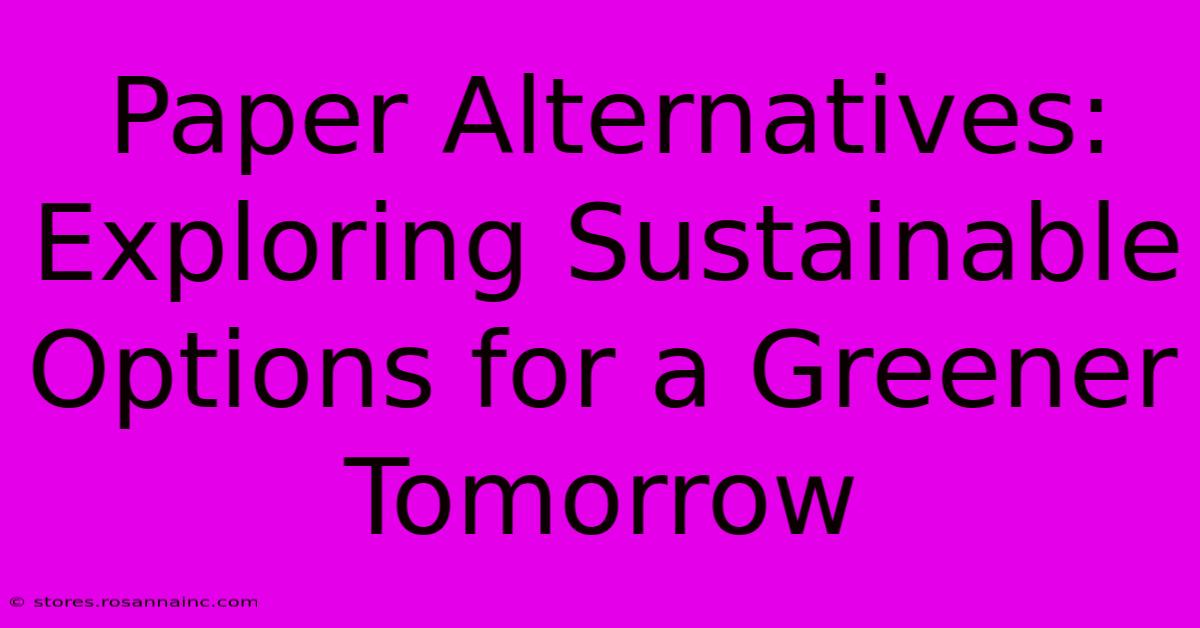Paper Alternatives: Exploring Sustainable Options For A Greener Tomorrow

Table of Contents
Paper Alternatives: Exploring Sustainable Options for a Greener Tomorrow
The world's reliance on paper has undeniable environmental consequences. Deforestation, water pollution, and greenhouse gas emissions are all linked to traditional paper production. Fortunately, a growing number of sustainable alternatives are emerging, offering eco-conscious individuals and businesses a chance to reduce their environmental footprint. This article explores several viable paper alternatives, highlighting their benefits and drawbacks to help you make informed choices for a greener tomorrow.
Why Choose Paper Alternatives?
Before diving into specific options, let's understand why switching from traditional paper is crucial. The paper industry is a significant consumer of resources:
- Deforestation: Vast tracts of forests are cleared to provide the raw material for paper production, leading to habitat loss and biodiversity reduction.
- Water Consumption: The paper manufacturing process is incredibly water-intensive, placing strain on already stressed water resources.
- Energy Consumption: Manufacturing paper requires substantial energy, often derived from fossil fuels, contributing to greenhouse gas emissions.
- Chemical Use: The bleaching and processing of paper pulp involve the use of harmful chemicals that can pollute waterways and harm ecosystems.
Choosing paper alternatives directly mitigates these environmental impacts, contributing to a healthier planet.
Top Sustainable Paper Alternatives
Several innovative materials offer compelling alternatives to traditional paper, each with its own unique set of advantages and disadvantages.
1. Bamboo Paper
Strengths: Bamboo is a rapidly renewable resource, requiring less water and pesticides than trees. Bamboo paper is often stronger and more durable than traditional paper.
Weaknesses: While generally sustainable, the processing of bamboo paper can still involve some chemical use, though often less than with tree-based paper. Availability might be limited depending on your location.
2. Hemp Paper
Strengths: Hemp grows quickly and requires minimal pesticides and water. Hemp paper is incredibly strong and durable, making it ideal for various applications.
Weaknesses: Hemp remains somewhat regulated in certain regions, potentially limiting its widespread adoption. The processing of hemp paper can also involve some chemical treatments.
3. Recycled Paper
Strengths: Recycled paper significantly reduces the demand for virgin wood pulp, minimizing deforestation and energy consumption. It's readily available and often more affordable than other alternatives.
Weaknesses: The quality of recycled paper can vary, and repeated recycling can degrade the fibers, resulting in lower quality.
4. Seed Paper
Strengths: Seed paper is embedded with seeds, allowing it to be planted after use, growing into wildflowers or herbs. It's a unique and eco-friendly option for invitations, cards, and promotional materials.
Weaknesses: Seed paper is often more expensive than other alternatives and may not be suitable for all applications due to its relatively delicate nature.
5. Digital Alternatives
Strengths: Going completely digital eliminates the need for paper altogether, significantly reducing environmental impact. This is the most environmentally friendly option.
Weaknesses: Requires access to technology and can contribute to e-waste if not managed responsibly. Not all applications are easily transferable to a digital format.
Choosing the Right Alternative
The best paper alternative depends on your specific needs and priorities. Consider the following factors:
- Intended Use: The durability and strength required will influence your choice.
- Budget: Some alternatives, like seed paper, are more expensive than others.
- Availability: Check the availability of different alternatives in your region.
- Environmental Impact: Research the production methods and environmental certifications of the chosen alternative.
Embracing a Greener Future
Switching to sustainable paper alternatives is a powerful step towards environmental responsibility. By making conscious choices, we can collectively reduce the environmental burden of paper consumption and create a more sustainable future. Whether you choose bamboo, hemp, recycled paper, seed paper, or digital alternatives, every effort counts towards a greener tomorrow. Let's all strive for a future where environmental consciousness is integrated into our everyday decisions.

Thank you for visiting our website wich cover about Paper Alternatives: Exploring Sustainable Options For A Greener Tomorrow. We hope the information provided has been useful to you. Feel free to contact us if you have any questions or need further assistance. See you next time and dont miss to bookmark.
Featured Posts
-
South Carolina X Ray Costs Prepare To Pay Up Or Be Pleasanty Surprised
Feb 05, 2025
-
Prepare To Be Amazed The Incredible Transformation Of Oil Can Fresno
Feb 05, 2025
-
Fantasy Football Revolution The Rise Of Girl Power Names That Will Crush
Feb 05, 2025
-
Transform Your Nails Overnight The Gel Bottle Biab Your Ultimate Nail Savior
Feb 05, 2025
-
Purple Pursuit The Relentless Search For The Ethereal Gand
Feb 05, 2025
